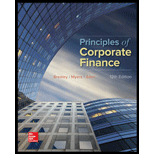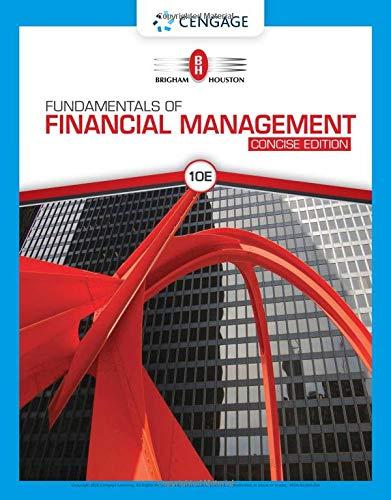
Concept explainers
Valuing Tree cash flow Phoenix Corp. faltered in the recent recession but is recovering.

Phoenix’s recovery will be complete by 2021, and there will be no further growth in free cash flow.
- a. Calculate the PV of free cash flow, assuming a
cost of equity of 9%. - b. Assume that Phoenix has 12 million shares outstanding. What is the price per share?
- c. If the 2016 net income is $1 million, what is Phoenix’s P/R ratio? How do you expect that P/E ratio to change from 2017 to 2021?
- d. Confirm that the expected
rate of return on Phoenix stock is exactly 9% in each of the years from 2017 to 2021.
a)
To determine: Present value of free cash flow
Explanation of Solution
Compute the present value of free cash flow:
Hence, the present value is $26.68 million.
b)
To determine: Price per share
Explanation of Solution
Note:
Assume no debt, the share price are as follows,
Hence, the price per share is $2.04.
c)
To determine: PE ratio and change in PE ratio from 2017 to 2021.
Explanation of Solution
Compute PE ratio:
Compute PV of the cash flows at various points in time:
Changes in PE ratio:
d)
To confirm: The expected rate of return is 9%.
Explanation of Solution
Compute rate of return using the formula
Thus, the above calculation shows that the rate of return on Company P is exactly 9%.
Want to see more full solutions like this?
Chapter 4 Solutions
Principles of Corporate Finance (Mcgraw-hill/Irwin Series in Finance, Insurance, and Real Estate)
- Quantitative Problem: Barton Industries expects next year's annual dividend, D1, to be $2.50 and it expects dividends to grow at a constant rate g = 4.9%. The firm's current common stock price, PO, is $20.00. If it needs to issue new common stock, the firm will encounter a 5.3% flotation cost, F. What is the flotation cost adjustment that must be added to its cost of retained earnings? Do not round intermediate calculations. Round your answer to two decimal places. % What is the cost of new common equity considering the estimate made from the three estimation methodologies? Do not round intermediate calculations. Round your answer to two decimal places.arrow_forwardXYZ company has the following expected cash flows for three scenarios that could occur: Recession Expected Expansion (prob. = .2) (prob. = .5) (prob. =.3) EBIT $10,000 $20,000 $30,000 MV Assets ______ ______ ______ (a) Complete the table above if the company is 100% equity financed and the non-levered return on equity is expected to be 12% (b) If the company pays tax at a 30% rate and it wants to recapitalize (debt for equity swap) to save on taxes, what is the most debt the company can add (at a 6% rate) so that it will never go bankrupt under the above scenarios? (Assume the company goes bankrupty if EBIT < Interest owed) (c) Calculate the WACC for the unlevered case and for the result in part (b). (d) What is the market value of the assets if the firm chooses the debt level in part (b)? (e) If further analysis suggests that the…arrow_forwardThe cost of equity using the discounted cash flow (or dividend growth) approach Grant Enterprises's stock is currently selling for $32.45 per share, and the firm expects its per-share dividend to be $1.38 in one year. Analysts project the firm's growth rate to be constant at 7.27%. Estimating the cost of equity using the discounted cash flow (or dividend growth) approach, what is Grant's cost of internal equity? O 15.55% . 11.52% O 12.10% O 10.94% Estimating growth rates It is often difficult to estimate the expected future dividend growth rate for use in estimating the cost of existing equity using the DCF or DG approach. In general, there are three available methods to generate such an estimate: • Carry forward a historical realized growth rate, and apply it to the future. • Locate and apply an expected future growth rate prepared and published by security analysts. • Use the retention growth model. Suppose Grant is currently distributing 50% of its earnings in the form of cash…arrow_forward
- Problem . Valuation of equity X Company paid dividends of 2.12 in 2022. The dividends are expected to grow at 5%per year in the long term and the company has a cost of equity of 9.40%. What is the value per equity share?arrow_forwardAt the beginning of 2016, you invested $20,000 in Jersey Mike's Corporation (JMC), trading at $20 per share. JMC earned a return of 14% in 2016, 20% in 2017, -8% in 2018. Assume the risk-free rate is 3% per year. You can treat this risk-free asset as an asset with a constant rate of return. What was the cumulative return from the start of 2018 to the end of 2018 if you had formed the following portfolios: A. Buy 500 shares of JMC, invest the remainder in the risk-free asset. B. Buy 2,000 shares of JMC on margin, borrowing at the risk-free rate. (Hint: When you borrow from the risk-free asset, its weight in your portfolio should be negative.) C. Short-sell 1,000 shares of JMC, invest the remainder in the risk free asset.arrow_forwardQuantitative Problem: Barton Industries expects next year's annual dividend, D1, to be $1.70 and it expects dividends to grow at a constant rate gL = 5%. The firm's current common stock price, P0, is $23.60. If it needs to issue new common stock, the firm will encounter a 5.7% flotation cost, F. Assume that the cost of equity calculated without the flotation adjustment is 12% and the cost of old common equity is 11.5%. What is the flotation cost adjustment that must be added to its cost of retained earnings? Round your answer to 2 decimal places. Do not round intermediate calculations. % What is the cost of new common equity? Round your answer to 2 decimal places. Do not round intermediate calculations. %arrow_forward
- Question: Hart Enterprises recently paid a dividend of $1.25. It expects to have non constant growth of 20% for 2 years followed by a constant rate of 5% thereafter. The firm's required return is 10%. a. How far away is the terminal, or horizon, date? b. What is the firm's horizon, or terminal, value? c. What is the firm's intrinsic value today?arrow_forwardAssume IBM is expected to pay a total cash dividend of $3.90 next year and dividends are expected to grow indefinitely by 3.0 percent a year. Assume the required rate of return (i.e. equity holder's opportunity cost of capital) is 9.3 percent. Assuming this is the best information available regarding the future of this firm, what would be the most economically rational value of the stock today (i.e. today's "price")? Answer to 2 decimal places.arrow_forwardSuppose the dividends for the Seger Corporation over the past six years were $1.40, $1.48, $1.57, $1.65, $1.75, and $1.80, respectively. Assume that the historical (arithmetic) average growth rates will remain the same for 2022. Compute the expected share price at the end of 2022 using the perpetual growth method. Assume the market risk premlum is 11.7 percent, Treasury bills yield 5.9 percent, and the projected beta of the firm is 0.88. Note: Do not round Intermediate calculations. Round your answer to 2 decimal places. Answer is complete but not entirely correct. Share price S 1.80arrow_forward
- Integrative Risk and valuation Giant Enterprises' stock has a required return of 14.8%. The company, which plans to pay a dividend of $2.93 per share in the coming year, anticipates that its future dividends will increase at an annual rate consistent with that experienced over 2013-2019 period, when the following dividends were paid: a. If the risk-free rate is 5%, what is the risk premium on Giant's stock? b. Using the constant-growth model, estimate the value of Giant's stock. (Hint: Round the computed dividend growth rate to the nearest whole percent.) c. Explain what effect, if any, a decrease in the risk premium would have on the value of Giant's stock. a. If the risk-free rate is 5%, the risk premium on Giant's stock is%. (Round to one decimal place.) Carrow_forwardIntegrative-Risk and valuation Giant Enterprises' stock has a required return of 14.2%. The company, which plans to pay a dividend of $1.84 per share in the coming year, anticipates that its future dividends will increase at an annual rate consistent with that experienced over 2013-2019 period, when the following dividends were paid: E. a. If the risk-free rate is 6%, what is the risk premium on Giant's stock? b. Using the constant-growth model, estimate the value of Giant's stock. (Hint: Round the computed dividend growth rate to the nearest whole percent.) c. Explain what effect, if any, a decrease in the risk premium would have on the value of Giant's stock. a. If the risk-free rate is 6%, the risk premium on Giant's stock is %. (Round to one decimal place.) b. Using the constant-growth model, the value of Giant's stock is $ . (Round to the nearest cent.) c. Explain what effect, if any, a decrease in the risk premium would have on the value of Giant's stock. (Select from the…arrow_forwardIII. Free Cash Flow Valuation Goodyear Industries is considering going public but is unsure of a fair offering price for the company. The firm's CFO has gathered data for performing the valuation using the free cash flow valuation model. The firm's weighted average cost of capital is 11% and it has P1.5 million of debt at market value and P500,000 of preferred stock at its assumed market value. The estimated free cash flows over the next 5 years 2016 through 2020 are given below. Beyond 2020 to infinity, the firm expects its free cash flow to grow by 3% annually. 2016-P 250,00 2019-P 450,000 2017- 320,000 2020- 480,000 2018- 400,000 Required: Using the free cash flow valuation method, estimate the value of Goodyear Industries' entire company, the total value of Common Stock and the estimated value per share assuming the firm plants to issue 250,000 shares of common stock.arrow_forward
 EBK CONTEMPORARY FINANCIAL MANAGEMENTFinanceISBN:9781337514835Author:MOYERPublisher:CENGAGE LEARNING - CONSIGNMENT
EBK CONTEMPORARY FINANCIAL MANAGEMENTFinanceISBN:9781337514835Author:MOYERPublisher:CENGAGE LEARNING - CONSIGNMENT Intermediate Financial Management (MindTap Course...FinanceISBN:9781337395083Author:Eugene F. Brigham, Phillip R. DavesPublisher:Cengage Learning
Intermediate Financial Management (MindTap Course...FinanceISBN:9781337395083Author:Eugene F. Brigham, Phillip R. DavesPublisher:Cengage Learning Fundamentals Of Financial Management, Concise Edi...FinanceISBN:9781337902571Author:Eugene F. Brigham, Joel F. HoustonPublisher:Cengage Learning
Fundamentals Of Financial Management, Concise Edi...FinanceISBN:9781337902571Author:Eugene F. Brigham, Joel F. HoustonPublisher:Cengage Learning




